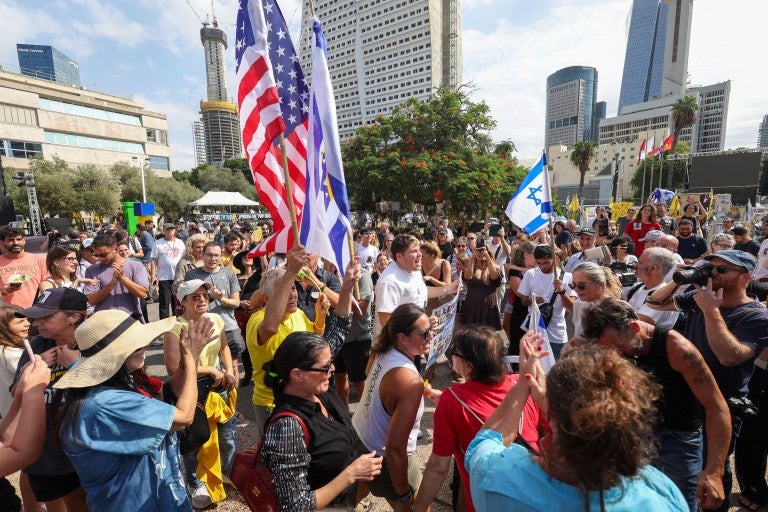April 2, 2025
Large demonstrations, which began over judicial reforms before October 7, have grown in response to the government’s handling of the Gaza war and Israeli Prime Minister Benjamin Netanyahu’s recent efforts to remove the attorney general and the head of the Shin Bet, Israel’s top domestic security and counter-terrorism chief.
Here is what to know about the protests and what is fueling them.
Why are some Israelis protesting?
Israeli society is facing a formidable list of challenges - both internally and externally - which could have a profound impact on the future of the nation. To express their differing views in Israel’s robust democracy, Israelis frequently and proudly exercise their right to protest.
While the demonstrations unfolding now are smaller than the protests over judicial reforms prior to the October 7 attacks, they are now compounded by other issues, including the continued hostage crisis and the government’s overall handling of the war in Gaza, as well as the the Prime Minister’s attempts to fire Attorney General Gali Baharav-Miara and the head of Shin Bet, Ronen Bar. The war has amplified concerns about judicial reforms and state interests vs. political interests. While opponents already argued that the reforms would weaken democracy by limiting judicial oversight, many now believe the government is pursuing actions that seek to protect Prime Minister Netanyahu and his allies from legal pressures, at the expense of the best interests of the State.
What are the perspectives of Israelis?
Many families of hostages accuse the government of prioritizing military action over their loved ones’ release, arguing that relentless strikes in Gaza reduce the chances of a negotiated deal. By contrast, some hostage families are supportive of the government and its approach. A small group of hostage families called the Hope Forum is even advocating for more military pressure.
Many Israelis claim Netanyahu resumed the war in Gaza, following the end of the initial phase of the January 2025 agreement between Israel and Hamas to restore right-wing support for his government, in order for him to be able to to pass a national budget and remain in power – and, secondarily, to deflect from his corruption trial and taking responsibility for October 7 – prioritizing political survival over diplomacy.
Meanwhile, some IDF reservists criticize the government’s Gaza strategy as poorly managed and ineffective, saying the lack of clear objectives and prolonged conflict are undermining public trust. Others are pleading for more boots on the ground because the war has taken such a toll on the troops.
The State of the Hostage Crisis and Defensive War in Gaza
Fighting in Gaza resumed on March 18 primarily due to the collapse of ceasefire negotiations between Israel and Hamas. The most recent pause in fighting, which aimed to facilitate hostage releases and the entry of humanitarian aid, broke down when Hamas refused to meet Israel’s demands for the return of hostages, and Israel determined it would be unable to hold phase two negotiations. At the latest count, 59 hostages remain in Hamas captivity. Israel believes that 35 of these hostages are deceased and 24 are still alive, including an American citizen, Edan Alexander.
Hamas’ Refusal to Release Hostages: In a negotiation process facilitated by Egypt, U.S. Special Envoy Steve Witkoff proposed a plan to extend a brief ceasefire for 50 days while parties negotiated phase two of the hostage talks. Netanyahu accepted that proposal, but Hamas rejected it. This led Israel to resume military action against Hamas to halt its re-armament and pressure for the hostages’ release.
Since then, talks have moved forward a bit, but with miles to go. Hamas has asked for a 50-day ceasefire, a guarantee of a permanent ceasefire, and hundreds of prisoners in exchange for five hostages of their choosing, refusing to confirm whether they’re dead or alive. Israel has asked for 11 living hostages amid a 40-day ceasefire.
Meanwhile, Hamas continues to torture hostage families with the release of terribly cruel propaganda videos of hostages in captivity.
On March 24, Hamas released a propaganda video showing two Israeli hostages, Elkana Bohbot and Yosef-Haim Ohana, who appeared malnourished and read a script about their dire situation. Netanyahu responded on March 26, saying that Hamas' refusal to release hostages would lead to increased Israeli military actions, including seizing territory.
Then on Saturday, Hamas released another three-minute video of Bohbot, begging for his release so that he could reunite with his wife and his 5-year-old son.
In regard to Israel’s defensive war against Hamas, U.S. Secretary of State Marco Rubio has told Netanyahu he has the Trump administration's “unwavering support for Israel and its policy,” after previously criticizing Hamas' demands as “nuts.” The U.S. has also been clear in its desire to reach a negotiated settlement that sees the return of all the hostages and disarms Hamas.
On April 2, Israel expanded its operations in Gaza, Defense Minister Israel Katz announced. Troops will clear areas of militants and infrastructure while securing additional territory for Israel’s security, Katz stated. He also urged Gazans to “act now to overthrow Hamas and return all the hostages.”
Meanwhile, Hamas has threatened Israel that if it pushes ahead with military operations, all of the 59 remaining hostages will return to Israel in coffins. Former hostages and their families have joined the families of those who remain in captivity to push for a deal that will bring them home alive.
Who is Ronen Bar, and why is he under fire?
Ronen Bar is the head of Shin Bet, Israel’s domestic intelligence agency, and has served as a hostage negotiator as part of Israel’s indirect talks with Hamas. He was appointed by former Prime Minister Naftali Bennett in October 2021 for a five-year term.
Why did the Israeli government fire him? Netanyahu cited a "persistent personal and professional distrust" of Bar, while critics viewed the move as politically motivated, aiming to obstruct investigations into the Prime Minister's office and undermine democratic institutions. The dismissal has sparked protests in Tel Aviv and Jerusalem, with tens of thousands also expressing anger over the government’s renewed military operations in Gaza.
Before the October 7 terror attacks, Bar reportedly told Netanyahu amid the protests over judicial reforms that there was a link "between security threats and the social situation in Israel.” He has expressed remorse for not doing more to prevent the October 7 massacre, suggesting he might resign, but refused when Netanyahu requested his resignation.
He also has launched a probe of alleged ties between Netanyahu’s top aides and Qatar, which backs Hamas. Recently, the Shin Bet arrested two of Prime Minister Netanyahu’s close advisors for allegedly working for Qatar while they were employed by the State of Israel. In response to the arrests, Prime Minister Netanyahu declared, “They are holding Jonatan Urich and Eli Feldstein as hostages. They’re embittering their lives over nothing at all. This is a political [witch] hunt.”
What’s next? The Israeli Supreme Court has temporarily suspended Bar’s removal, while the Attorney General and opposition leaders have vowed to challenge the decision, arguing that it threatens national security and weakens the country’s democratic checks and balances.
While Israel’s High Court of Justice extended a freeze on Bar’s ouster, it did not stop Netanyahu from talking to candidates who might replace him.
The investigation into the alleged Qatargate scandal is moving ahead.
Why is Israel's Attorney General clashing with Netanyahu?
In addition to firing Bar, Netanyahu’s cabinet is expected to oust Attorney General Gali Baharav-Miara, a former district attorney appointed under previous Prime Minister Bennett.
Attorney General’s role: Israel’s Attorney General differs from the U.S. version. While the U.S. Attorney General is nominated by the President and confirmed by the Senate, Israel’s Attorney General is a non-political appointment, nominated by the Justice Minister and approved by the cabinet to play a watchdog role. Without a formal constitution, Israel’s Attorney General upholds the rule of law, overseeing the justice system and holding the government accountable.
Why is the government moving to oust Baharav-Miara? Baharav-Miara has criticized rules of engagement during the war against Hamas and warned that the government’s previously proposed judicial reform plan, which would remove the court’s ability to strike down government decisions based on reasonableness, could undermine democracy and the rule of law. She also opposes Ronen Bar’s removal as head of Shin Bet.
Supporters of Netanyahu’s government, which is composed primarily of right-wing, far-right, and ultra-Orthodox political parties, accuse Bar and Baharav-Miara of obstructing the government’s ability to govern.
They argue that Bar’s actions, including investigations into Netanyahu’s office, and Baharav-Miara’s legal challenges to the government’s judicial reforms, undermine the elected leadership and hinder decisive action on security and policy matters. Many in these groups view the officials as part of a deep-seated bureaucracy working against the will of the people, and they support Netanyahu’s efforts to remove them, seeing it as a necessary step to restore stronger governance and advance their nationalist and religious agendas. Prime Minister Netanyahu recently declared that “Democracy isn’t in danger; the rule of bureaucrats is in danger. The deep state is in danger.”
What’s next? Though a plurality of Israelis support removing the attorney general, protesters do view her as a key safeguard against government overreach. Critics argue that her removal would politicize the legal system, weaken judicial independence, and undermine checks and balances. Government supporters, however, contend that her dismissal is necessary to align the legal system with the government's policies, claiming she has politicized her role by opposing key reforms and obstructing the government’s ability to govern effectively.
On March 23, the Israeli cabinet voted unanimously in favor of a no-confidence motion against the attorney general, designed to speed up her removal process. Israel's opposition leaders condemned the motion as further evidence of the coalition undermining the rule of law.





